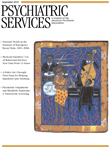Pathways to Recovery, a Peer-Led Group Intervention
The authors of Pathways to Recovery: A Strengths Recovery Self-Help Workbook ( PTR ) have converted the perspectives and methods of the strengths model of case management, an evidence-supported practice, into a self-help approach for adults with severe psychiatric symptoms. The workbook was developed in collaboration with mental health consumers, recovery educators, and care providers in 2002; a separate group facilitator guide was completed in 2006. The workbook provides a format for users to identify their personal strengths and the strengths offered within their environment to clarify and pursue their personal life goals. The main objectives of PTR are to encourage users to express their desires and goals, discover strengths, and use them as the foundation for finding meaning, purpose, and value in life.
PTR guides users to develop a personalized recovery plan and to explore and create goals within nine life domains: home, education and learning, personal assets, work and career, social support, health and wellness, intimacy and sexuality, leisure and recreation, and spirituality. Each chapter of PTR contains background information, worksheets, vignettes by consumers, inspirational quotes, references, and resources.
Although originally created as a personal self-help guide, PTR has been successfully used in a group setting, allowing for peer-to-peer interaction and support for developing individualized recovery life plans. The benefits of the peer group setting include sharing the positive and challenging experiences of mental illness, validating one's own and others' strengths through supportive discussions, and bolstering motivation toward recovery. The University of Kansas School of Social Welfare developed a PTR group intervention, consisting of 12 weekly 90-minute sessions led by a trained peer facilitator. All 12 sessions follow module 1 of the PTR group facilitator guide, which acts as the curriculum. The intervention is designed to support enhancement of group participants' self-esteem, self-efficacy, hope, and community network. Each session has a lesson plan that includes discussion questions and small-group activities.
Within this 12-week format, participants read sections of the workbook, perform recommended activities to generate discussion of chosen topics, and complete supplemental handouts. Each group incorporates all core activities, although the ordering of the sessions is flexible, depending on the interests of participants. The recommended group size is between six and 13 participants. Each group includes development of basic group protocols and an overview of recovery. Discussions of the strengths perspective help participants identify both personal (qualities, attitudes, and talents) and environmental (informal and formal support available in the person's community) strengths for themselves as well as others. Challenges to recovery are discussed based on potential changes needed in attitude, behavior, and cognition. The sessions also include the completion of self-assessments and development of action plans to facilitate movement and motivation toward recovery. Participants have opportunities to participate in small-group projects and then share their learning with the larger group. The final group session ends with celebratory activities and evaluation of the overall group experience.
Our initial single-group (N=47) pre-post design evaluation found significant gains in participants' self-esteem, self-efficacy, social support, and spiritual well-being, as well as a reduction in self-reported psychiatric symptoms. One participant described the group experience in this way: "Attending the Pathways group changed my life in lots of ways. I've made my own personal 'recovery turnaround.' I'm exercising, getting out with friends, and thinking about going back to school. Pathways gave me the tools I needed to be able to see these goals can be achieved. My own recovery is richer now."
The incorporation of self-help educational approaches has become an increasingly popular approach to promoting and nurturing recovery. In response to the self-help movement, PTR has been used worldwide by individuals and groups at consumer-run organizations and professional service organizations. As an easily implemented and inexpensive method of conducting mental health self-help, PTR is particularly suited to the self-help approach within the peer-to-peer settings that consumer organizations offer. Given the inclusion of reimbursement for peer-provided Medicaid services, many states now fund peer-directed self-help services as an important element of overall mental health treatment. To ensure continuation of federal funding, it becomes even more necessary to conduct further research in this area.



